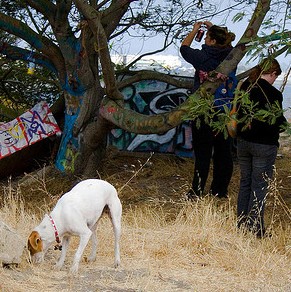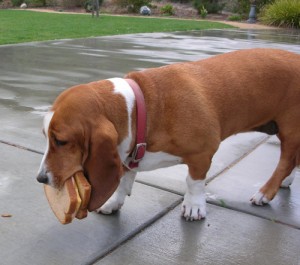Sometimes our dogs don’t want to do what we ask of them. Sometimes the rewards we offer them are not enough and they turn to “self-rewarding” behaviours. But are those behaviours really self-rewarding? It’s what our dog chooses to do so it must be. But what else is “self-rewarding” behaviour? The answer might surprise you.
 Years ago my wife and I were introduced to a training term – “self-rewarding behaviour.” At the time, my wife and our Belgian Tervuren Vince were attending agility classes. This particular training company had handlers and their dogs form groups of 3 or 4 teams and rotate between 4 “stations” that included different exercises and agility equipment. This system required the dog and handler to wait their turn, often for several minutes at a time. During that waiting time, our dog Vince used to grab his leash in his mouth and chew on it, sometimes going right through it. This was identified by the instructors as “self-rewarding behaviour” because Vince was deciding for himself what to do because he wanted to do it.
Years ago my wife and I were introduced to a training term – “self-rewarding behaviour.” At the time, my wife and our Belgian Tervuren Vince were attending agility classes. This particular training company had handlers and their dogs form groups of 3 or 4 teams and rotate between 4 “stations” that included different exercises and agility equipment. This system required the dog and handler to wait their turn, often for several minutes at a time. During that waiting time, our dog Vince used to grab his leash in his mouth and chew on it, sometimes going right through it. This was identified by the instructors as “self-rewarding behaviour” because Vince was deciding for himself what to do because he wanted to do it.
That definition, “self-rewarding behaviour” seemed perfectly reasonable to me until I started reading more about behavioural science and the use of Operant Conditioning in training animals. After learning some basic principles of behaviour, the term “self-rewarding behaviour” no longer made sense to me. There seemed a better way to express what was going on and it also made it easier to manage as a handler.
Reinforcement Versus Reward
One of the problems we face as dog trainers is the imprecise language we use when talking about training our dogs. Not only can it make talking with other trainers challenging, not having clear definitions can cause us to fool ourselves into trying techniques that are ineffective or worse. One example of this is how we use “reward” and “reinforcement” (and their variations) in relation to how we train.
The terms “reinforcement” and “reward” are often used interchangeably by trainers. While they do seem to mean the same thing, they may mean very different things in different situations. The term “reinforcement” comes from psychology and behavioural science and, by strict definition, means anything that causes a behaviour to become more likely, more frequent, or more intense. By this defintion, things we don’t consider to be “rewards” may still act as “reinforcement” in making a behaviour stronger.
One example of this happens in my own home. Over the years we have left food items on our counters within reach of a doggy nose. These occasional “snacks” for my dog Tira have led to her becoming a tireless counter-surfer who checks out the surfaces daily. Our carelessness was never meant as a “reward” but they have certainly “reinforced” her counter-surfing behaviour!
On the other hand, many dog owners “reward” their dogs all the time without any thought to training or increasing a particular behaviour. We love our dogs and many times we “reward” them with a cookie or some play time just because they are adorable and we enjoy their company. We “reward” our dogs because we intend to do something nice for them, not necessarily just to train behaviours. I’m pretty sure that “being cute” isn’t a behaviour but I reward my Tira for it quite often!
Serve Yourself Rewards
In my experience, most trainers who use the term “self-rewarding behaviour” are referring to unwanted behaviours being performed instead of what you want the dog to do. For example, your dog is “self-rewarding” by sniffing along the fence instead of coming when called and walking at “heel” next to you. The dog is simply choosing to do something that they like instead of what is being asked. As someone who uses behavioural science to train, this poses an interesting question – doesn’t my dog always make the choice to do what I ask or not?
Mark and Reward Training, like Clicker Training, uses “reinforcement” to increase the behaviours we are trying to train. The whole training approach depends on offering my dog something she wants. That could be food treats, play, affection, or anything that she is interested in working for. So in a very real sense, the proposition for my dog is this: do this thing I’m asking for and you get this reward. In this case, since I’m using it to increase behaviour, the “reward” is, in fact, a “reinforcement” (assuming I’m a good trainer and the behaviour increases). So not all “rewards” are reinforcements and not all “reinforcement” are rewards.
So here’s the confusing problem; doesn’t my dog ultimately decide if she wants what I’m offering or not? In the case of training, I’m offering what I believe is a high value “reward” in exchange for her cooperation in learning the behaviour. If my training is successful, my “reward” will reinforce the behaviour and make it easier for me to get her to give me that behaviour next time. But my dog must first decide to try to get that reward.

It’s All Self-Rewarding!
This is where the logic of the phrase “self-rewarding behaviour” broke down for me all those years ago. If my dog is always deciding to get the reward or not, all of her behaviour is self-rewarding and not just the behaviours I didn’t ask for. It may seem a subtle distinction but my dog is, after all, choosing to cooperate when she responds to me when I say “Come” or “Sit.” She is finding more value in cooperating with me than doing anything else.
This might seem like just a difference in wording or language but, as I discussed earlier, the words we use can be important to how we proceed with our training. The usual response I see when someone uses the term “self-rewarding behaviour” in response to an unwanted behaviour is to try to stop the behaviour. If the dog is finding something other than the trainer more interesting, why not look at the reward system rather than the behaviour?
Competing Rewards
The world is full of stuff dogs like. Consequently, there is pretty fierce competition for your dog’s attention. I could spend an entire article on dealing with competing rewards (and I will, to be sure!) but for now, let’s just assume that on any given day a smell or a sound might be more enticing to your dog than your cue to “Come.” Not to worry! There are things we can do as trainers to give ourselves every advantage.
Rather than deal with terms like “self-rewarding behaviour”, my wife and I have chosen instead to focus on “rewards management.” We do the best we can to have control over what rewards are available to our dogs in any given situation. So if we are teaching a new behaviour, it’s best to work in a relatively boring environment without a lot of distractions that could compete for our dog’s attention. Deciding what environment to work in can be very important to how successful we are in working with our dog.
We also have a special tool we use. History. Behavioural Science has shown that the more a dog has been reinforced for a particular behaviour, the more likely they will be to perform that behaviour in the face of distractions or competing rewards. Think of it as a good habit. So the better rehearsed a behaviour is, the better our chance of success in complicated situations where lots of rewards may be available. For that reason, we work on behaviours with our dogs while slowly moving them to more and more distracting environments until I can ask for “Come” or “Sit” at a crowded park on a spring day without my dog running off to meet the poodle across the way.
We’ve changed our approach. It’s not a “self-rewarding behaviour” problem to us anymore, it’s a “rewards management” problem. It’s up to us as handlers and trainers to be aware of what rewards are out there and to prepare ourselves and our dogs as best we can so that everyone gets what they want from any given situation. By focusing on managing access to rewards rather than trying to control behaviour, my wife and I have worked out a system that sets our dogs up for success and keeps us focused on keeping their training challenges achievable.
For us, it’s more about cooperation than it is confrontation. Rather than fight with my dog about whether or not they should be doing a particular behaviour, we try to manage access to the reward that makes that behaviour appealing. It just seems to be a simpler approach to the problem and it puts the control squarely in our hands. Instead of trying to change the dogs behaviour so they don’t try to get something they want, we just make sure we offer them something more valuable or remove their access to that competing reward.
If we knew back then what we know now, my wife would have thought to bring a toy for Vince to play with instead of his leash (she did eventually bring a ball to class for Vince) and we might have saved a few bucks replacing them. But more importantly, she would have been spared the frustration of trying to figure out why Vince was engaging in “self-rewarding behaviour” instead of working with her. Eventually we learned. Control the available rewards and things can sort themselves out pretty quickly.
Next time you see your dog doing something you might consider “self-rewarding” ask yourself what you could do to offer something more rewarding that could change that behaviour. Of course there are things you could do to make the current reward less appealing like yelling at your dog or threatening them if they don’t stop. But I believe that my readers are much more creative than that! Manage the rewards and you can manage the behaviour.
Until next time, have fun with your dogs!
Photo credits –
Sniff – Orin Zebest 2008
What’s this – LifeSupercharger 2011
Theft – Soggydan 2009
Good Girl – sneakerdog 2007






Hi,
I like your articles a lot! But here I don’t agree on your definition of self-rewarding behaviour. Although I know it’s generally used the same way you use it, I understand it differently.
My understanding of this term is that it is about a behaviour that’s rewarding for the dog, even if there are no external reinforcements to follow. So for example sniffing at the garbage is in my opinion not self-rewarding behaviour, because the sniffing itself is not rewarding, it’s the food the dog may find.
When a behaviour is self-rewarding it is the behaviour itself that gives the dog a good feeling, so the reward is internal, and so it can be used as a training tool as well. Chasing a toy is self-rewarding and we can use it as a training tool.
Another examples is hunting. Some dogs like to hunt, even if they never catch anything. Self-rewarding behaviour can occupy a dog that has little else to do, like a dog chasing his tail all the time in a kennel. Chasing the tail makes the dogs brain release endorphin, so it’s a self-rewarding behaviour, but in our eyes, there is no reward to be seen.
I myself have a Border Collie who was five months old when I got her. She lived in a kennel a few months and had occupied herself with chasing shadows. It was impossible to get her attention when she saw shadows and food did not interest her. A few months later however, she could be called off from shadow chasing and would do anything for a cookie. So it is not impossible to compete with the self-rewarding behaviour by rewarding alternative behaviour, but it can be very hard.
So, the thing I disagree on is, I don’t use the term self-rewarding for behaviours that do get followed by an external reward.
Hope to read more articles of you, they are very interesting.
Best wishes,
Elise
The Netherlands
I found two articles in English using the same definition of self-rewarding behaviour as I do. There are many articles in Dutch using it as well.
http://qualityaussies.webs.com/socializingyouraussie.htm
“In an Aussie, chasing moving objects is a very self rewarding behavior (meaning it feels good so it doesn’t need an outside reward like praise or treats.)”
http://www.clickertraining.biz/herdingDrywork.htm
“Catching the toy can be self-rewarding behavior that needs no additional reinforcement.”
Hi Geoff –
Interesting comment. When is a reward NOT a positive reinforcement? When it doesn’t actually REINFORCE the behaviour. Not all rewards increase behaviour just as not all aversives “punish” or decrease behaviour. Just because you INTEND something as a reward, that doesn’t mean it will necessarily reinforce the behaviour. Only additional observation to see if the behaviour improved will tell you if it was reinforced or not. A reward is something you give to the dog and a reinforcer is something that DID the job of increasing or improving behaviour. Just because you gave the dog a treat, it doesn’t mean you trained him.
To your point, why is this important? Why quibble over terminology? Well, let’s take your example: The dog zooming around the agility course by his own choice. As a trainer, it would matter a great deal to me whether or not the “zooming” behaviour increased as a result of having the ability to do it. If it doesn’t increase, it may be a reward, a release from the difficult task of focusing on the handler. And so, in that case, nothing to worry about. On the other hand, it may be that the dog is choosing to “zoom” more and more frequently as the activity is REINFORCING the dog’s choice to ignore the handler. THAT would be an issue I would want to address.
The point of the article was that we should have better control of rewards so that they can’t inadvertently reinforce behaviours we don’t want. Using a long line on your dog in agility would allow you to manage access to “zooming” until you had a sufficient history of reinforcement where it wouldn’t be a problem.
Is language important in training? I think so. Rewards are not reinforcers. “Corrections” don’t necessarily correct anything. Inexact language leads to inexact application of techniques. And don’t we confuse our dogs enough?
However, that said, it’s just one dog-lover’s opinion. Your mileage may vary.
Eric
>> Not all rewards increase behaviour just as not all aversives “punish” or decrease behaviour. Just because you INTEND something as a reward, that doesn’t mean it will necessarily reinforce the behaviour
<<
Sure. That may be a useful way to define it. A reward is simply then something pleasurable, yes? Not contingent. If you want to use the term that way, OK. I guess I think of dogs as being perpetual reward seekers, what Carl Sagan called (in a different context) "significance junkies" who are always calculating the payoff of a strategy.
As for corrections that don't correct, well, we might end up in a tangle there, because for many people "correction" is terminologically pre-loaded.
Eric… Lots of distinctions are possible, but not always more than semantically useful. Maybe a reward is simply a positive reinforcement: something given to make an antecedent behavior more likely to recur or continue or intensify.
Maybe the distinction becomes useful when we have a conflict or contrast between what the dog wants to do (finds inherently reinforcing, such as helter-skelter running around the agility ring) and what we want the dog to do for the sake of the rewards we offer (such as taking our direction around the course). The dog spurns our food treats or tug toys, because rocketing around on a course of his own design is more — well, is it rewarding? reinforcing? See what I mean: to the dog, the distinction doesn’t matter.